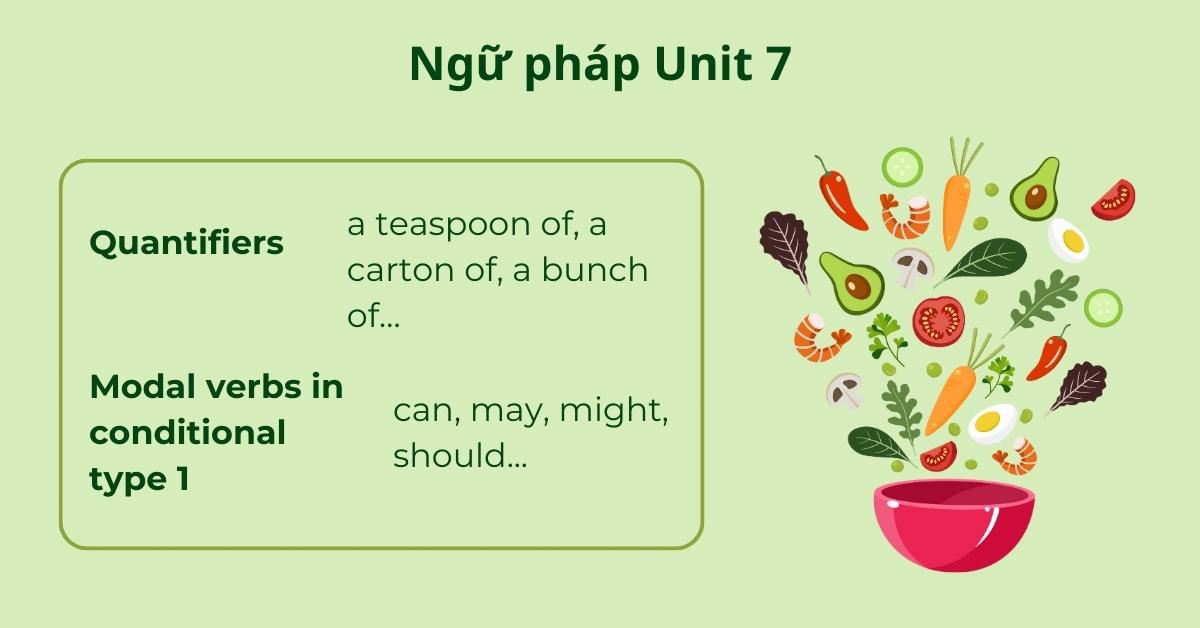Resources for Unit 3. Healthy Living for Teens – Global Success 9
| Site: | vinhphuc.topgrade.edu.vn |
| Course: | Tiếng Anh Tăng Cường lớp 9 - Phúc Yên |
| Book: | Resources for Unit 3. Healthy Living for Teens – Global Success 9 |
| Printed by: | Guest user |
| Date: | Monday, 7 July 2025, 8:52 PM |
1. Vocabulary for Unit 3. HEALTHY LIVING FOR TEENS
Vocabulary for Unit 3. HEALTHY LIVING FOR TEENS.
1.1. Vocabulary for Week 5. Lessons 1 - 3. U3. Global Success 9
counsellor
(n) /ˈkaʊnsələr/ = advisor (cố vấn).e.g. She spoke to a school counsellor about her career options.

balanced
(a) /ˈbælənst/ = stable (cân đối).e.g. A balanced diet is crucial for maintaining good health.

priority
(n) /praɪˈɒrəti/ = preference (ưu tiên).e.g. Safety is our top priority at this construction site.

stress
(n) /strɛs/ = pressure (căng thẳng).e.g. He is under a lot of stress at work these days.

optimistic
(a) /ˌɒptɪˈmɪstɪk/ = hopeful (lạc quan).e.g. Despite the challenges, she remains optimistic about the future.

accomplish
(v) /əˈkɒmplɪʃ/ = achieve (hoàn thành).e.g. He managed to accomplish all his goals for the year.

distractions
(n) /dɪˈstrækʃənz/ = diversions (sự phân tâm).e.g. Avoiding distractions is key when working from home.

due date
(n) /ˈdjuː deɪt/ = deadline (hạn nộp).e.g. The project's due date was moved up to the end of the month.

stressed out
(a) /strɛst aʊt/ = overwhelmed (bị stress nặng).e.g. She was feeling stressed out due to the exam period.

delay
(v) /dɪˈleɪ/ = postpone (trì hoãn).e.g. Bad weather might delay the flight's departure.

modal verbs
(n) /ˈmoʊdəl vɜrbz/ = auxiliary verbs (động từ khiếm khuyết).e.g. Modal verbs like 'can' and 'may' express ability or permission.

conditional sentences
(n) /kənˈdɪʃənəl ˈsɛntənsɪz/ = hypothetical statements (câu điều kiện).e.g. Conditional sentences are often used to discuss possible outcomes.

mental health
(n) /ˈmɛntəl hɛlθ/ = psychological well-being (sức khỏe tinh thần).e.g. Taking breaks is important for your mental health.

physical health
(n) /ˈfɪzɪkəl hɛlθ/ = bodily health (sức khỏe thể chất).e.g. Regular exercise is beneficial for your physical health.

manage time
(v) /ˈmænɪdʒ taɪm/ = schedule (quản lý thời gian).e.g. Learning how to manage time effectively can improve productivity.

1.2. Vocabulary for Week 6. Lessons 4 - 7. U3. Global Success 9
well-balanced
(a) /ˌwɛl ˈbælənst/ = harmonized (cân đối).e.g. She leads a well-balanced life between work and leisure.

anxiety
(n) /æŋˈzaɪəti/ = worry (lo âu, lo lắng).e.g. He felt a lot of anxiety before the public speaking event.

additional
(a) /əˈdɪʃənl/ = extra (thêm vào, bổ sung).e.g. They requested additional resources to complete the project.

appropriately
(adv) /əˈproʊpriətli/ = suitably (phù hợp, đúng cách).e.g. She dressed appropriately for the formal dinner.

fattening
(a) /ˈfætənɪŋ/ = calorie-dense (làm tăng cân).e.g. Avoid fattening foods if you are trying to lose weight.

encouragement
(n) /ɪnˈkɜrɪdʒmənt/ = support (khích lệ, động viên).e.g. His words of encouragement helped her overcome her fears.

delay
(v) /dɪˈleɪ/ = postpone (trì hoãn).e.g. The project was delayed due to unforeseen circumstances.

priority
(n) /praɪˈɒrəti/ = precedence (sự ưu tiên).e.g. Health should always be a top priority.

optimistic
(a) /ˌɒptɪˈmɪstɪk/ = positive (lạc quan).e.g. She is optimistic about the chances of success.

accomplishment
(n) /əˈkɒmplɪʃmənt/ = achievement (thành tựu, thành tích).e.g. Graduating with honors was a major accomplishment for him.

distractions
(n) /dɪˈstrækʃənz/ = interruptions (sự phân tâm, xao lạc).e.g. He finds it hard to work at home because of constant distractions.

schedule
(n) /ˈʃɛdʒuːl/ = timetable (lịch trình).e.g. She checked her schedule to see if she could attend the meeting.

efficiently
(adv) /ɪˈfɪʃəntli/ = effectively (hiệu quả).e.g. The new system processes data more efficiently than the old one.

productivity
(n) /ˌproʊdʌkˈtɪvɪti/ = output (năng suất).e.g. The manager introduced new methods to increase productivity.

routine
(n) /ruːˈtiːn/ = regimen (thói quen hàng ngày).e.g. Morning exercise is part of her daily routine.

2. Grammar for Unit 3. Modal verbs in first conditional sentences

Động từ khiếm khuyết trong câu điều kiện loại 1
Trong phần kiến thức này, người học cần lưu ý:
Thay vì sử dụng cấu trúc thông thường (will + động từ nguyên mẫu ở mệnh đề chính), người học có thể thay thế will bằng các động từ khiếm khuyết khác như: can, must, may, might hoặc should trong mệnh đề chính.
Ví dụ: If you eat a balanced diet, you may feel more energized throughout the day. (Nếu bạn ăn một chế độ ăn uống cân bằng, bạn có thể cảm thấy năng lượng hơn trong suốt cả ngày.)
3. Video Lecture for Unit 3. Healthy Living for Teens
Video Lecture for Unit 3. Healthy Living for Teens.
4. Hướng Dẫn & Thực hành Phát Âm Unit 3 (Global Success 9)
Bấm vào các link Mục lục (Table of Contents) để xem Video Hướng dẫn và Thực hành Phát âm.
Phần Thực hành phát âm nên học trên máy tính.
4.1. Thực hành phát âm – Pronunciation. Practice. Unit 3
Sounds /h/ and /r/
Click the buttons to listen, say aloud, and record. Compare your voice with the sample pronunciation. Practice each sentence at least 3 times.